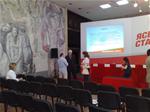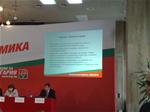The BSP will again construct for the next 4 years the same highways
Adelina Marini, June 12, 2009
 The BSP (Bulgarian Socialist Party) presented its governance programme for the period 2009-2013, from which we derive the conclusion that the socialists promise almost the same as they did 4 years ago: building of modern and balanced (whatever that means) transport infrastructure with focus on the railway transport; speeding of the construction of the main highways "Lyulin", "Thrace", "Maritsa", "Struma", parts of "Hemus". Beside this, a main priority for a second term of the socialists would be tourism with its differentiated VAT rate of 7%, increase of the spending for advertising and rehabilitation of the Bulgarian tourism companies abroad. We can also anticipate decrease of the social security rate until it reaches the corporate and income tax of 10%.
The BSP (Bulgarian Socialist Party) presented its governance programme for the period 2009-2013, from which we derive the conclusion that the socialists promise almost the same as they did 4 years ago: building of modern and balanced (whatever that means) transport infrastructure with focus on the railway transport; speeding of the construction of the main highways "Lyulin", "Thrace", "Maritsa", "Struma", parts of "Hemus". Beside this, a main priority for a second term of the socialists would be tourism with its differentiated VAT rate of 7%, increase of the spending for advertising and rehabilitation of the Bulgarian tourism companies abroad. We can also anticipate decrease of the social security rate until it reaches the corporate and income tax of 10%.
In the economic field there are plenty of ideas of the socialists, formulated more in detail than in other fields where their ideas are in the form of slogans. The current minister of the economy and energy Petar Dimitrov explained that he intends to decrease the sanctions' mechanisms for the business, to create a National Investment Fund with starting capital of 2-2.5 bn lv (1.025-1.28 bn euro), financed by the Bulgarian taxpayers and the business as well. Introduction of the principle of the silent approval for specific decisions of the administration which would be determined after discussions with the business. Petar Dimitrov's statement made it further clear that the principle of silent approval will not be general but only for certain things.
The programme also includes the creation of a tax register which main task would be the enhanced return of VAT to companies that are good taxpayers. In the meantime the minister of finance Plamen Oresharski warned that the BSP intends very seriously to fight the grey economy as one of the measures would be punishing the irregulars payers. But these measures will not harm in any way the good payers. The idea is everyone in the country to understand that paying taxes by everyone is a condition for loyal competition.
In the economic field the socialists will continue the tendency for creation of mega state structures, taken out from the past. For example, Petar Dimitrov intends, beside rehabilitating the tourism companies abroad which are from the time of the totalitarism in Bulgaria, but also to establish a special organisation, called BulTrade which will deal with all Bulgarian trade marks and products, intended for export. But it is not clear how will these structures be financed and whether someone will count them responsible if their work is ineffective and they don't bring home new investors.
Petar Dimitrov also announced a very special anti-crisis measure which is in contradiction with  a campaign that started recently for quick trials against irregular payers, The BSP is ready of grant transition periods for all companies that suffer from the crisis and give them some months without paying their social security and tax duties. But it's not mentioned how many months would this transition period be. AT the moment the state is doing just the opposite - it has started mass trials against people with debts. There are no public criteria on the reasons for this new practice which has not been announced officially. But it might be related to the problems with the implementation of the budget for 2009.
a campaign that started recently for quick trials against irregular payers, The BSP is ready of grant transition periods for all companies that suffer from the crisis and give them some months without paying their social security and tax duties. But it's not mentioned how many months would this transition period be. AT the moment the state is doing just the opposite - it has started mass trials against people with debts. There are no public criteria on the reasons for this new practice which has not been announced officially. But it might be related to the problems with the implementation of the budget for 2009.
The budget will also finance, as a continuation of the current policy of the socialists, starting innovative companies, technological parks and scientific research and innovation. This would also be supported by the euro funds, the policy of which presented Radoslav Ivanov who presided over the sub commission on European funds which is part of the European affairs committee in Parliament. From his short presentation we couldn't understand nothing beside the plans of the reds to work actively with OLAF (whatever that means), to cooperate directly with the EU and to prevent corruption practices. The lack of more clarifications given the total lack of transparency for the past 4 years, is strange against the background of the promises for preliminary, current and post control. It is also not quite clear how the socialists intend to convince the European Commission to unfreeze the pre-accession money and not to freeze the European funds. And no word at all about any civil control.
In the field of energy there's no change in the ideas of the BSP. But the interesting thing is that in the field of transport the socialists intend, again, to construct highways, started tens of years ago. And if the expectations of people are the completion of these highways to be a high priority, they are wrong. The main priority of the socialists would be the construction of a modern and balanced railway infrastructure. The largest project, which the BSP will start work, is the railway Vidin-Sofia-Kulata, the price of which is expected to be more than 2.4 bn euro because it has to correspond to the speed requirements. That is why the transport minister Petar Mutafchiev explained that if he won a second term, he would prepare by 2012 the documents for the project so that it could be included in the next financial perspectives of the EU 2014-2021.
 But instead, 4-lane speeding roads would be constructed on the Black sea coast, between the towns of Mezdra and Botevgrad and between Ruse and Veliko Tarnovo. It is not quite clear, though, why exactly these projects are selected and based on what criteria. 60% renovation of the passenger wagonry of the Bulgarian Railway Company (BRC), mainly from Bulgarian wagon construction companies. Not word on possible restructuring of the state BRC so that the company to be able to work more effectively with the money of the taxpayers. Petar Mutafchiev intends also to gradually remove the vignette system and introduce the toll-system.
But instead, 4-lane speeding roads would be constructed on the Black sea coast, between the towns of Mezdra and Botevgrad and between Ruse and Veliko Tarnovo. It is not quite clear, though, why exactly these projects are selected and based on what criteria. 60% renovation of the passenger wagonry of the Bulgarian Railway Company (BRC), mainly from Bulgarian wagon construction companies. Not word on possible restructuring of the state BRC so that the company to be able to work more effectively with the money of the taxpayers. Petar Mutafchiev intends also to gradually remove the vignette system and introduce the toll-system.
(further details on the fight against corruption, social policy and environment will follow soon)